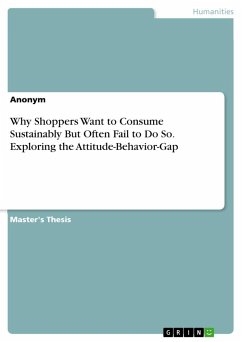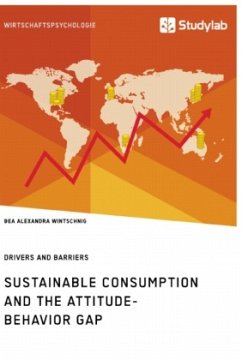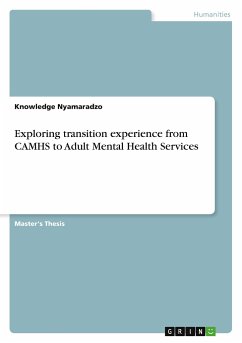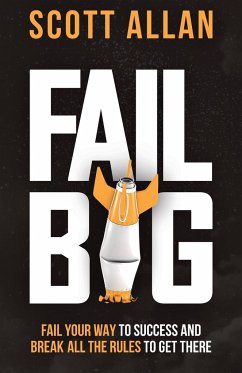
Why Shoppers Want to Consume Sustainably But Often Fail to Do So. Exploring the Attitude-Behavior-Gap

PAYBACK Punkte
0 °P sammeln!
Master's Thesis from the year 2023 in the subject Psychology - Industrial and organizational psychology, grade: 1,3, University of Applied Sciences Hamm-Lippstadt, language: English, abstract: The purpose of this thesis is to further explore the existence and underlying factors of the ABG in more detail. As the field of sustainable food consumption plays a crucial role in reducing GHG emissions, this work is limited to the food retail sector. To further specify the research context, this thesis is based on the age cohort of Gen Z. In this respect, the intention is to understand what motivates ...
Master's Thesis from the year 2023 in the subject Psychology - Industrial and organizational psychology, grade: 1,3, University of Applied Sciences Hamm-Lippstadt, language: English, abstract: The purpose of this thesis is to further explore the existence and underlying factors of the ABG in more detail. As the field of sustainable food consumption plays a crucial role in reducing GHG emissions, this work is limited to the food retail sector. To further specify the research context, this thesis is based on the age cohort of Gen Z. In this respect, the intention is to understand what motivates members of Gen Z to consume sustainably. On the other hand, it aims to find out what factors prevent Gen Z from behaving in accordance with their sustainable motivation and attitude. Furthermore, as Gen Z members can be seen as future leaders and decision makers, it is particularly important and interesting to analyze the consumption behavior of this cohort in more detail. The results of this work are intended to contribute to a better understanding of the ABG among Gen Z members in the context of food consumption. From these findings, practical implications will be derived that can contribute to a greener future for the planet and help retailers and the government to better design point of sale (POS) interventions and other campaigns to increase sustainable shopping behavior among consumers. In addition, further areas of research can be identified that have the potential to expand the body of knowledge on sustainable food consumption. Sustainability is probably the most discussed topic in recent times, and it is noticeable that it must be integrated into almost every aspect of life. It is evident that the population is increasingly adopting pro-environmental attitudes, but there is little change in their actual behavior. The resulting Attitude-Behavior-Gap can be observed in various consumption contexts, such as in food consumption. More precisely, the food system is responsible for 30 percent of greenhouse gas emissions, thus food consumption must become more sustainable to meet the climate goals. However, although the issue of sustainability in different consumption contexts is widely discussed, little is known about the drivers and barriers of sustainable food consumption, the reasons why an Attitude-Behavior-Gap occurs and how shoppers deal with it. Using a Grounded Theory approach, in-depth insights are gained from eleven interviews with a sample of Generation Z members. The main barriers to sustainable food consumption were found to be habitual buying, convenience, selfishness, and financial reasons.













